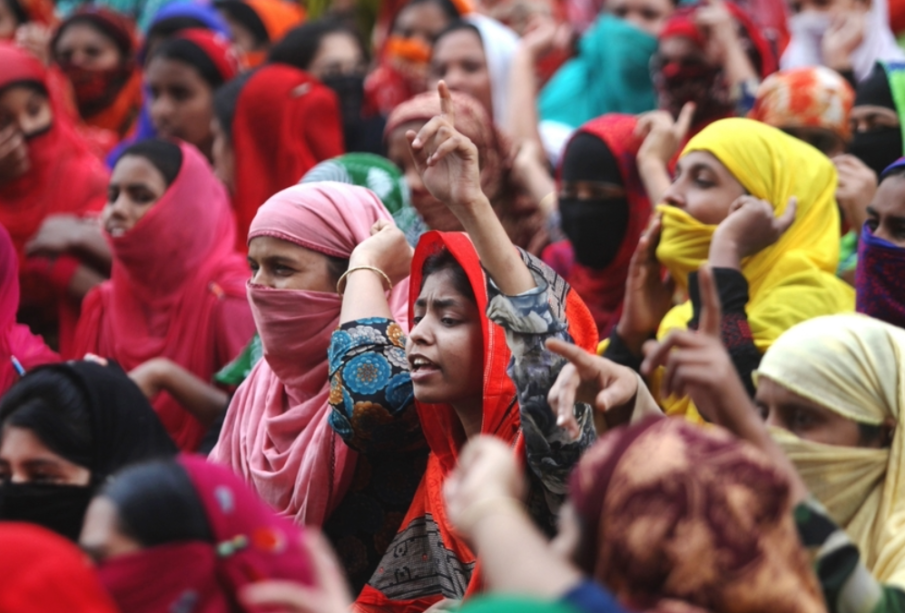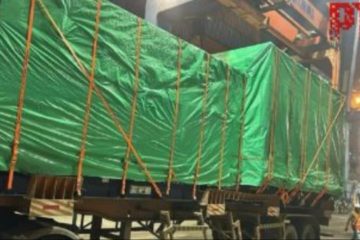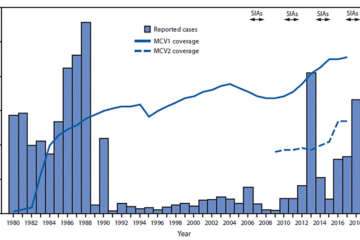Pakistan and the Intersection of Tech & Elections | TechPolicy.Press – Tech Policy Press

Pakistan and the Intersection of Tech & Elections | TechPolicy.Press Tech Policy Press
Audio of this conversation is available via your favorite podcast service.
It’s become trite to say there are a lot of elections taking place this year. And of course, technology is playing a role in them all.
At Tech Policy Press, we’re lucky to have a group of seven fellows this year who are based on four continents. They are paying close attention to elections in the nations they know best. To learn more about the recent election in Pakistan, its chaotic aftermath, and the unique role of technology and events there, I spoke to one of our fellows last week: Ramsha Jahangir, a Pakistani journalist currently based in the Netherlands. Check out her recent piece on internet disruptions in Pakistan on Al Jazeera.
A lightly edited transcript of the discussion follows below.
Justin Hendrix:
Ramsha, for Tech Policy Press listeners who are not paying close attention to politics in Pakistan, can you just give us a sense of what has happened there over the last few weeks?
Ramsha Jahangir:
So Pakistan entered elections on February 8, which is after months and months of delay. And as the results came in, it was quite a controversial election, because prior to the election started, one of the leading parties of Pakistan, the Pakistan Tehreek-e-Insaf, led by former Prime Minister Imran Khan, was denied the opportunity to contest in elections under their party name, as form of ongoing censorship by the government. So there was a lot of controversy prior to the election.
And then evidently, once the results came in, it was evident that efforts to curb support for former Prime Minister Imran Khan’s party, who is now directly in jail, that those efforts fell short on election day. So the candidates backed by PTI emerged as the largest bloc in parliament, but because they contested as independents and weren’t allowed to contest as party party. Since then, there has been a lot of confusion and political turmoil that has followed, because the other parties are claiming that they would form a coalition government. So it’s been a lot of chaos. But overall, the climate of censorship continuing in Pakistan, even post-elections.
Justin Hendrix:
Where does this leave Imran Khan himself? How will his situation change as a result of this election?
Ramsha Jahangir:
He continues to be in jail, but his party, particularly his very tech-savvy PTI supporters, are the ones leading his election campaign and post-election campaign as well. The future looks very unsure still. We don’t know how things will unfold and they’re developing on a daily basis. But we’re seeing that most likely PTI-affiliated candidates would take an opposition role, while the other, the largest parties, would form a coalition government, excluding the PTI from power.
Justin Hendrix:
If you are an advocate for democracy and the rule of law, what are you hoping will happen in the next few weeks? How do you hope this situation resolves?
Ramsha Jahangir:
This is a complex situation, given Pakistan’s political history. Personally, the exercise of elections has been very controversial and non-transparent. So there obviously a lot of doubts. Firstly, because one of the largest parties was not allowed to contest the elections. That already puts a lot of doubt and questions this whole exercise. But going forward also, and like I mentioned, this is all happening in the overall climate of censorship. So it’s very hard to believe and put trust in the government that will come into power going forward. So unless we restart, it’s difficult to say. Again, I’m saying that there has been skyrocket inflation and growing repression in the months leading up to the elections as well. So there’s a lot of outrage amongst the people.
Justin Hendrix:
I’m speaking to you on the day that you’ve just published a piece in Al Jazeera, which opens with two sentences, “In Pakistan, the internet has become a battleground, not one fought with tanks and missiles, but with throttled bandwidth and targeted shutdowns.” We talk about the role that the internet is playing in this political crisis.
Ramsha Jahangir:
So a lot’s been happening. Firstly, a little bit of context. So PTI, the party facing censorship, has been using technology for years. They’re actually the pioneer party to introduce digital politics in Pakistan. Even in 2013 national elections, 2018 national elections, they were one of the first parties to introduce the use of technology for election campaigning, fundraising, and politics. And then Imran Khan, when he was in the government, he became the first Pakistani prime minister to officially use social media for political communication as a prime minister. So they already come with this strong hold on the use of technology for politics.
Now that they’re facing a lot of repression and censorship, they were not allowed to contest elections. Their official party website has been blocked and they also, post-election, created a lot of open-source websites. I would call it an open-source repository of electoral data to show evidence of election rigging. That has been blocked in Pakistan as well and continues to be blocked. Twitter actually, as we speak, still continues to be inaccessible in large parts of Pakistan. It’s entering the four day of disruption. And primarily, this is because PTI and their supporters have been using Twitter and social media platforms to mobilize and generate evidence of election rigging.
Justin Hendrix:
Is there any response from the platforms themselves? Any apparent involvement of tech executives in this situation?
Ramsha Jahangir:
There hasn’t been a word. No, not from the government, not from platforms. But there is a lot of evidence showing that at least pointing to self rights NetBlocks, the internet watchdog, has been monitoring these disruptions. So there is evidence to show and [inaudible 00:06:39] these disruptions, but there hasn’t been any communication from the government or platforms.
Justin Hendrix:
This isn’t the only thing that’s going on with technology and politics in Pakistan. I think one of the things we want to talk about is the extent to which AI has played some role as a method of production for various communications. And I guess as someone who’s sitting over here in the US, everyone’s wondering, “Will generative AI play some role in our election cycle this year?” But we’re already seeing it play a role in multiple other places and impact others. Sounds like this election has provided some interesting examples.
Ramsha Jahangir:
Absolutely. It’s Pakistan’s case has been very fascinating, because while we’ve been seeing a lot of deep fakes in, especially the election context around the world. In Pakistan, it’s not actually disinformation overly. So give you context, PTI, Iran Khan, their leader was in jail to get the written word out through the leadership’s mouth. PTI used a AI audio to replace Imran Khan and give a speech while he was in jail. So they’ve been doing this pre-elections, post-elections. They’ve been using AI as a replacement for Khan to get the word out to the masses.
And usually, PTI’s politics has been very Imran Khan driven. He’s the central focus of their politics, so it really helps. So AI has really helped them continue to connect with the people and continue to campaign on his behalf because of that audio. One thing I think I would really mention is, they’ve been very responsible in their use of AI. So they’ve very prominently mentioned in those videos that this is an AI-recorded audio, and it’s synthetic media and it’s not supposed to be taken that people shouldn’t trust it.
Of course, that opens up millions of possibilities of what this means for AI and politics in Pakistan, where people are not as tech-savvy, people are not as digital-literate. But they’ve actually, I think this case is very interesting, because it’s using AI as a replacement, but also to their campaign against censorship. So the use of AI in the face of censorship makes it a very interesting case.
Justin Hendrix:
Just one point of clarity for me on the use of AI to recreate Imran Khan’s voice and deliver speeches. In this case, are folks puppeting Imran Khan or delivering material that he’s somehow approved? Is that something we know?
Ramsha Jahangir:
Yeah. So the PTI party says that the script is written by Khan himself while in jail or he’s communicated those words through his lawyers, and then they’ve used an avatar of Imran Khan, using AI. And also, Eleven Labs is the audio service they’ve used to recreate content in his own voice.
Justin Hendrix:
I want to talk about some of the other phenomena that we see there and, of course, around the world. It’s very common now for people to create different organizational structures to share information, engage in collective social media posting, try to steer the narrative, trying to steer the media, that kind of thing. I understand that PTI is also using what it calls “virtual jalsas.”
Ramsha Jahangir:
Yes, virtual rallies. Jalsas mean rallies. Yeah, so they’ve actually been using virtual jalsas. They started using Twitter spaces, which was when Imran Khan was voted out of power. But they’ve been using Twitter spaces very regularly and broken records. Actually, one of the first times they used Twitter spaces, Imran Khan was part of it. And there hasn’t been official confirmation from Twitter, but it was said to be one of the largest Twitter spaces gathering so far in the world.
And then they’ve also more recently started conducting virtual jalsas on TikTok. That’s also been very record-breaking, a lot of people attending from all over the world. I do want to emphasize that PTI, of course, is a Pakistani party, but a lot of their supporter base is global. So that’s also very interesting that a lot of volunteers who come from educated backgrounds, technicians, computer scientists, software engineers, based in US, working high-tech jobs are actually volunteering day and night to run this whole digital campaign, and that’s been the case from the get-go.
And this is what makes them interesting, right? They’re not just limited in Pakistan. They have a chapter in US, they have a chapter in Spain, in UK, in the Middle East, in different parts of the world. And when Twitter campaigns and hashtags used to be a thing, now it’s a thing of the past. They’ve actually broken global records in setting those campaigns and making them a global success as well. So I think that also makes this whole thing very interesting.
And lastly, on the point of innovation, what was interesting in terms of their innovative use of technology this time was that, because people couldn’t talk to Imran Khan directly while he was in jail, and there has been a lot of censorship. They’re not allowed to be on mainstream media, they were not allowed to… And then Twitter disruptions were happening, internet shutdowns were happening.
So they created a chatbot linked to Khan’s official Facebook page, so people could write to Iran Khan’s official page asking about their polling station information. And in a response they would get to know where they’re supposed to go vote. And then post-elections, how many votes were cast to different candidates at those polling stations. I find that also a very innovative way of raising awareness about elections and voting that they’ve very cleverly used to their benefit.
Justin Hendrix:
A lot of the narrative around the role of artificial intelligence and the way it might intersect with social media with regard to elections around the world is one of fear. It’s risk-oriented discourse at this point. A lot of people concerned about those things, including many people writing on Tech Policy Press and myself for that matter. But in a way, is this a counter narrative, a counter story in some ways that we’re seeing perhaps some of the benefits of these technologies for expression and creative ways that folks can evade oppression? I mean, you’ve literally got someone using AI to give voice to someone who is in prison.
Ramsha Jahangir:
I don’t think, yes, this is a very, not a countering perspective, but a different perspective, the way AI has been used. And like I said with pure disclaimers, the political party intended to inform public that this is not real audio. But then, also, I think there are two sides to it. One is, of course, it’s innovative. Another, I was speaking to other political parties during my reporting on elections in Pakistan was, “How has AI helped you?” And a lot of parties in Pakistan don’t have the resources.
They don’t spend on political advertising on social media as much as, for instance, parties in India. So there is a lack of resources, digital awareness, and people said that AI has really helped them campaign and create content. Not always meant for misleading the audience, but, for instance, posters or election campaigning, writing social media posts, using ChatGPT, something as simple as that. They said when they don’t have a lot of resources, AI has helped them.
Not everyone has all these supporters based around the world, right? So there’s certainly this cost-cutting, cost-effective solution that AI proposes to politics. Then, of course, the innovative use replacing a politician win in the face of censorship. But all of this comes with a caveat, if it’s used responsibly. And let’s face it, we’re all using AI one way or the other. As much as we want to deny that, I do think AI is slowly, and actually very fast, quickly taking space in our lives.
But we have to be responsible and we have to be very aware of the way we use it and the responsible use of it. And that isn’t to say that Pakistan hasn’t witnessed the use of deepfakes. There have been deepfakes specifically of Imran Kkan. So there is that side to it, but that said, I do want to appreciate PTI for being very out-front about their use of using synthetic media when using for Khan’s [inaudible 00:15:36].
Justin Hendrix:
What are you watching for in the next couple of weeks? How will you know which direction things are going to go, what the trajectory of things will be?
Ramsha Jahangir:
It’s still unfolding. It’s, like I said, every day is a new story. Personally, I would like accessibility of platforms to return. Like I said, Twitter continues to be disrupted in Pakistan. People are using VPNs, but also now reporting that some major VPNs are no longer working in Pakistan, so there is a lot of limitations to digital access. That’s the first and foremost thing I would like to see being resolved, and more accountability and transparency from the government about why they have been doing this.
Because, so far, there hasn’t been a single word explaining what the reasons are, even though we know what they are, but it should be officially coming from the government. In terms of politics, like I said, I think this has set a good precedent. There’s a lot of awareness amongst people about the political manipulation that has ensued in Pakistan. It’s a tough road economically, politically, from all perspectives, but I’m optimistic, because now there is a lot of awareness. And someone in PTI’s social media team actually told me this, that you can’t really lie anymore. It’s all out of the open.
Justin Hendrix:
Pakistan, just another one of the countries around the world with an election and with phenomena related to technology involved in those elections. A fascinating and important case study. Ramsha, thank you for talking us through it.
Ramsha Jahangir:
Thanks so much for having me.











